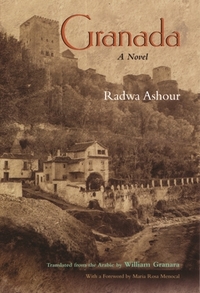You need to sign in or sign up before continuing.
Take a photo of a barcode or cover
Heart-wrenching. Phenomenal. Every one that has an opportunity to read this book, needs to read it.
While visiting Granada, this novel about an Arab family living in the Albaicin district at the time of the Catholic conquest of Granada in 1492 seemed like the perfect read. Very strong on historical detail, it was really shocking to learn how the Muslim families were treated and how politics has always affected whole communities. In Granada the Arabs’ books were burned and they were forced to convert and change their names. The first book in the trilogy had some fantastic characters that one really cared about but sadly I found the later two books less well plotted and rather rambling.
emotional
hopeful
reflective
sad
slow-paced
Plot or Character Driven:
Character
Strong character development:
Yes
Loveable characters:
Yes
Diverse cast of characters:
Complicated
Flaws of characters a main focus:
Complicated
emotional
informative
sad
medium-paced
Plot or Character Driven:
A mix
Strong character development:
Yes
Loveable characters:
Yes
Diverse cast of characters:
Yes
Flaws of characters a main focus:
No
This was a very mixed bag for me. I finished it partly because it was so short and a gift from a friend. I might have given up otherwise!
What I liked:
1) Really strong last few chapters. I thought it was moving, and Saleema felt close to the reader. There were some other moving moments as well, but I felt like those last few chapters were a highlight.
2) Great setting and choice of historical period. I came into this knowing nothing about Granada or the impact of the Inquisition on Arab populations, so I was learning while I read. It’s a period of dramatic transition, so that worked well.
What I didn’t like:
1) Very messy structure. For being 229 pages, it has an epic scope and not enough time (to me) to explore it. There are many characters and historical events covered very unevenly. It took the book 100 pages to feel like it found its focus.
2) Related to the first point, the transitions were so strange. A character gives birth and in the next sentence has 5 more babies, so I’m left like woah, ok, I guess 10 years or something have passed? Another example is when a character spoke, died, and was being washed for burial within 3 sentences. It was jarring and often left me confused about how old people were or how much time had passed.
3) This book was written in 1998, so perhaps it’s just dated, but there was some uncomfortable sexualization of young girls. Yes, they are getting married at a young age during this time, but I don’t know why the author needs to sexualize them from her omniscient 3rd person viewpoint. There’s also a romance between a male character and a “native” that felt very written-by-a-man but somehow wasn’t.
4) Lastly, the style here did not appeal to me. Most of the time there was a lot of distance between me and the characters, and events were summarized. I found the prose often quite awkward and dated. That I definitely want to blame on the translator, not Ashour.
My experience reading this was more like 2 stars. But I’m never sure with a book in translation how much of my dissatisfaction is from my ignorance, from the translation, or storytelling norm differences. So I gave this book 3 stars.
What I liked:
1) Really strong last few chapters. I thought it was moving, and Saleema felt close to the reader. There were some other moving moments as well, but I felt like those last few chapters were a highlight.
2) Great setting and choice of historical period. I came into this knowing nothing about Granada or the impact of the Inquisition on Arab populations, so I was learning while I read. It’s a period of dramatic transition, so that worked well.
What I didn’t like:
1) Very messy structure. For being 229 pages, it has an epic scope and not enough time (to me) to explore it. There are many characters and historical events covered very unevenly. It took the book 100 pages to feel like it found its focus.
2) Related to the first point, the transitions were so strange. A character gives birth and in the next sentence has 5 more babies, so I’m left like woah, ok, I guess 10 years or something have passed? Another example is when a character spoke, died, and was being washed for burial within 3 sentences. It was jarring and often left me confused about how old people were or how much time had passed.
3) This book was written in 1998, so perhaps it’s just dated, but there was some uncomfortable sexualization of young girls. Yes, they are getting married at a young age during this time, but I don’t know why the author needs to sexualize them from her omniscient 3rd person viewpoint. There’s also a romance between a male character and a “native” that felt very written-by-a-man but somehow wasn’t.
4) Lastly, the style here did not appeal to me. Most of the time there was a lot of distance between me and the characters, and events were summarized. I found the prose often quite awkward and dated. That I definitely want to blame on the translator, not Ashour.
My experience reading this was more like 2 stars. But I’m never sure with a book in translation how much of my dissatisfaction is from my ignorance, from the translation, or storytelling norm differences. So I gave this book 3 stars.
challenging
dark
emotional
fast-paced
challenging
emotional
medium-paced
challenging
emotional
sad
tense
medium-paced
I chose this book for #ReadingWomen2020 because I love Spain and its cultural history. This book met the requirement for Arab woman author because I read The Dove's Necklace last year.
This was so sweet and yet sad. Stories of Muslim families in Granada after Columbus came back. So much culture, tradition, love, and cruelty.
The book is short and it took it relatively slowly to absorb everything.
This was so sweet and yet sad. Stories of Muslim families in Granada after Columbus came back. So much culture, tradition, love, and cruelty.
The book is short and it took it relatively slowly to absorb everything.
Ashour gives a stunning account of several Muslim characters during the Spanish Inquisition in Granada. The city Granada is reflected in this historical fiction through the eyes of those who were forced to either convert or leave. Each of the characters is based on important historical situations at the time and become methods of personalising a historical narrative through their individual experiences. Many of the other reviews have mentioned the lack of general plot, disturbing situations or flat characters, but Ashour continues this series as a trilogy that reflects more on how politics can affect communities of people. Originally, the author was inspired to write the story through the events of the Gulf War and how those political policies changed the lives of many Muslims. This redefinition of an entire community of people is something that can be found through the history of Granada.
The book is short, and the other two versions haven't been published in English as of yet, but with history repeating itself in the form of political policies on an ever-increasing basis, it might be interesting to see the entire trilogy and how a modern public reacts to these books.
The book is short, and the other two versions haven't been published in English as of yet, but with history repeating itself in the form of political policies on an ever-increasing basis, it might be interesting to see the entire trilogy and how a modern public reacts to these books.





